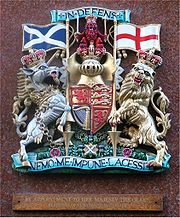
Royal Warrant of Appointment (United Kingdom)
Encyclopedia
| padding=2 cellspacing=0 style="background:#f9f9f9; text-align:left;"> |
Royal warrants of appointment have been issued for centuries to those who supply goods or services to a royal court or certain royal personages. The warrant enables the supplier to advertise the fact that they supply to the royal family, so lending prestige to the supplier. In the United Kingdom
United Kingdom
The United Kingdom of Great Britain and Northern IrelandIn the United Kingdom and Dependencies, other languages have been officially recognised as legitimate autochthonous languages under the European Charter for Regional or Minority Languages...
, grants are currently made by three members of the British Royal Family
British Royal Family
The British Royal Family is the group of close relatives of the monarch of the United Kingdom. The term is also commonly applied to the same group of people as the relations of the monarch in her or his role as sovereign of any of the other Commonwealth realms, thus sometimes at variance with...
to companies or tradesmen who supply goods and services to individuals in the family.
Suppliers continue to charge for their goods and services — a warrant does not imply that they provide goods and services free of charge. The warrant is typically advertised on company hoardings, letter-heads and products by displaying the coat of arms
Coat of arms
A coat of arms is a unique heraldic design on a shield or escutcheon or on a surcoat or tabard used to cover and protect armour and to identify the wearer. Thus the term is often stated as "coat-armour", because it was anciently displayed on the front of a coat of cloth...
or the heraldic badge
Heraldic badge
A heraldic badge is an emblem or personal device worn as a badge to indicate allegiance to or the property of an individual or family. Medieval forms are usually called a livery badge, and also a cognizance...
of the royal personage as appropriate. Underneath the coat of arms will usually appear the phrase "By Appointment to..." followed by the title and name of the royal customer, and then what goods are provided. No other details of what is supplied may be given.
History
The earliest recorded British royal charter was granted to the Weavers’ Company in 1155 by Henry II of EnglandHenry II of England
Henry II ruled as King of England , Count of Anjou, Count of Maine, Duke of Normandy, Duke of Aquitaine, Duke of Gascony, Count of Nantes, Lord of Ireland and, at various times, controlled parts of Wales, Scotland and western France. Henry, the great-grandson of William the Conqueror, was the...
.
Royal warrant holders

Warrants are currently granted for the Queen
Elizabeth II of the United Kingdom
Elizabeth II is the constitutional monarch of 16 sovereign states known as the Commonwealth realms: the United Kingdom, Canada, Australia, New Zealand, Jamaica, Barbados, the Bahamas, Grenada, Papua New Guinea, the Solomon Islands, Tuvalu, Saint Lucia, Saint Vincent and the Grenadines, Belize,...
, the Duke of Edinburgh
Prince Philip, Duke of Edinburgh
Prince Philip, Duke of Edinburgh is the husband of Elizabeth II. He is the United Kingdom's longest-serving consort and the oldest serving spouse of a reigning British monarch....
and the Prince of Wales
Charles, Prince of Wales
Prince Charles, Prince of Wales is the heir apparent and eldest son of Queen Elizabeth II and Prince Philip, Duke of Edinburgh. Since 1958 his major title has been His Royal Highness The Prince of Wales. In Scotland he is additionally known as The Duke of Rothesay...
. Warrants issued by the Queen Mother
Elizabeth Bowes-Lyon
Elizabeth Angela Marguerite Bowes-Lyon was the queen consort of King George VI from 1936 until her husband's death in 1952, after which she was known as Queen Elizabeth The Queen Mother, to avoid confusion with her daughter, Queen Elizabeth II...
automatically expired in 2007, five years after her death.
Some 800 individuals and companies, including a few non-UK companies, hold more than 1,100 warrants to the British Royal Family. Suppliers must have had a trading relationship with an individual in the family for at least five years before they can be considered for a warrant. Warrants are awarded at the discretion of the Lord Chamberlain
Lord Chamberlain
The Lord Chamberlain or Lord Chamberlain of the Household is one of the chief officers of the Royal Household in the United Kingdom and is to be distinguished from the Lord Great Chamberlain, one of the Great Officers of State....
, acting as the chairman of the Royal Household Tradesmen's Warrants Committee. Warrants are awarded for renewable terms of five years, though they can be revoked at any time; some warrants have been held for more than 100 years. Goods need not be for the use of the grantor. Cigarettes were only bought for the use of guests for example, but these warrants were cancelled in 1999 as a matter of public policy.
Royal warrants are only awarded to tradesmen. The professions, employment agencies, party planners, the media, government departments, and "places of refreshment or entertainment" (such as pubs and theatres) do not qualify.
A directory of royal warrant companies is available at the website of the Royal Warrant Holders' Association.
Features on products and services provided exclusively by royal warrant holders is available at The Royal Purveyors
External links
- Royal Warrants explained on the royal.gov.uk website
- The Royal Warrant Holders Association

